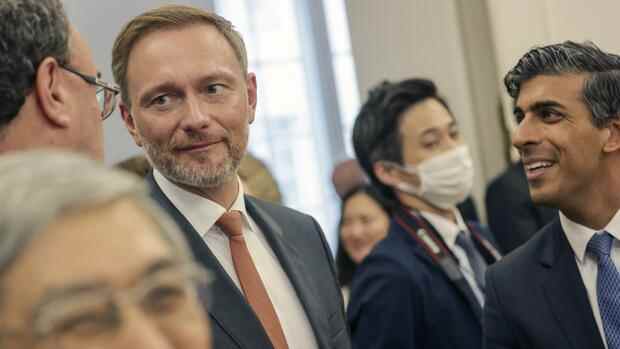royal winter The finance ministers of the leading industrialized countries (G7) put together another aid package for Ukraine at their meeting on the Petersberg near Bonn. There have been pledges of around nine billion euros ($9.5 billion) to help Ukraine close its funding gaps and ensure basic government services for the population, the final statement from the G7 meeting said.
With earlier commitments, budget support for Ukraine this year totaled €19.8 billion.
Federal Finance Minister Christian Lindner (FDP) spoke of a package “with which we want to ensure that Ukraine is financially capable of acting”. Ukraine’s financial situation should not limit its ability to act and defend itself militarily, the G7 host said. The 19.8 billion euros are in addition to humanitarian and military support.
“Ukraine’s liquidity is secured,” said Lindner. According to earlier data, Ukraine will need about $15 billion in the coming years. “The expectations were exceeded,” said Lindner.
Top jobs of the day
Find the best jobs now and
be notified by email.
However, the sum that was added at the meeting on the Petersberg is lower than it first appears. The $9.5 billion includes $7.5 billion from the US government, which pledged some time ago. Of the remaining two billion, one billion comes from Germany. To the $9.5 billion from the G7 countries comes $10.3 billion from the International Monetary Fund (IMF), bringing the total to $19.8 billion.
G7 wants to fight high inflation
Other topics besides aid to Ukraine were the development of the global economy and high inflation. “The G7 are determined to fight the development of inflation with consistent measures and to strengthen growth,” explained Lindner. Inflation is an “enormous threat” to economic progress.
Recently, inflation in the euro area reached a record high of 7.4 percent; in the US, inflation was even higher at 8.3 percent. In the talks, he summed up his conviction that the “central banks are very, very independent, but also have a very, very great responsibility”.
Bundesbank President Joachim Nagel promised to meet this responsibility. The European Central Bank (ECB) initiated a change in monetary policy in March when it decided to end its bond purchase programs.
He sees “the time has come for an interest rate hike, possibly as early as July,” explained Nagel. Further rate hikes could “follow in the near future”. The aim must be to bring inflation back to around two percent as quickly as possible.
Federal Finance Minister Lindner and Bundesbank President Nagel want to do something about high inflation.
(Photo: Reuters)
Lindner said he “welcomes” the planned rate hikes. Inflation risks also arise from the development of the external value of the euro. “We have to work on all inflation drivers.” From Lindner’s point of view, this also includes financial policy. “Now is the time to end the expansionary fiscal stance to get inflation dynamics under control,” he said. “We need to reduce deficits and get out of the broad spending programs that are putting additional pressure on prices.”
Lindner sees support from his colleagues in phasing out expensive output programs
According to Lindner, it is remarkable that all finance ministers of the G7 shared this “approach unanimously”. Colleagues from France and Italy did not raise any objections either, which is somewhat surprising. Most recently, both countries had pushed for new debt-financed spending programs at EU level.
But with his positions at the G7 finance ministers’ meeting, Lindner apparently struck a chord with his colleagues. Before Lindner took office, there had been great concerns internationally that the FDP politician would again be a financial hawk in the German Ministry of Finance.
The skepticism about Lindner culminated in a guest article by the US star economists Joe Stiglitz and Adam Tooze in the “Zeit” during the coalition negotiations at the beginning of November. In it they warned urgently against a Minister of Finance Lindner. Its budget policy is “antediluvian” because it adheres to “old clichés,” they wrote. “Neither Germany nor Europe can afford this type of crash test,” stated Tooze and Nobel Prize winner Stiglitz.
Question to Adam Tooze: After six months in office, is he still so critical of Lindner? “Lindner was more pragmatic than I expected,” said Tooze. Lindner also gets praise from trade union-friendly economist Achim Truger, who otherwise sharply criticizes the FDP’s financial policy. The FDP politician has so far “acted undogmatically” in office, says Truger.
But trugers like Tooze warn against a change of course by Lindner. In view of the recent election defeats, the Federal Minister of Finance must not start the old song about tax cuts and lean government.
Tooze believes that Lindner’s true agenda will only become apparent in the coming months when it comes to the future of European fiscal policy. Then it will be shown how much of his political agenda Lindner can push through.
More: Budget 2022: Traffic light coalition approves almost 5,300 new jobs
